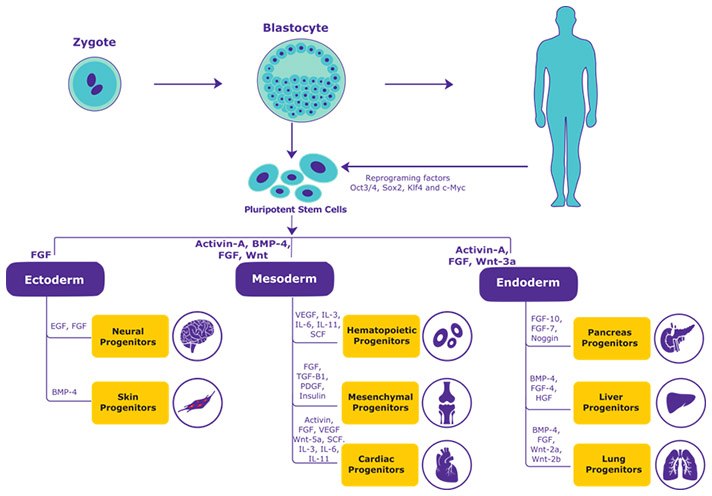Growth Factors in Stem Cell Biology
Stem cell biology researchers use suitable growth factors to trigger proliferation, differentiation and/or migration of stem cells. Embryonic pluripotent stem cells can differentiate into three germ layers (endoderm, mesoderm, and ectoderm) and unlimited capacity for self-renewal1,2. The ethical issues around the use of embryonic stem cells led to the introduction of induced pluripotent stem cells or iPSCs. In the presence of growth factors, iPSCs differentiate into majority of the progenitor cells required for development (Table 1). Therefore, the role of growth factors in differentiation of iPSCs provides an avenue for creating an unlimited supply of embryonic-like stem cells (Figure 1).

Figure 1.iPSCs differentiate into majority of the progenitor cells required for development in the presence of Growth Factors
Stem cell research is controlled by physical and biochemical cues that direct them to become the specialized cells that make up the tissues in the body. Stem cell research is enhancing our understanding of how growth factors (biochemical cues) affect stem cell expansion and differentiation. This will enable subsequent use of stem cells in cell-based therapies, drug development, and disease modeling.
Visit our Stem Cell Center to learn more
Explore all our growth factors
Troubleshoot your cell culture challenges

Figure 2.This image shows cells derived from the culture of neural stem cells grown in the presence of EGF (E9644) and LIF (L5283). The cells were expanded in neural stem cell expansion medium (S3194) and then moved to conditions to allow them to differentiate. Differentiated cells were fixed and stained with an antibody for GFAP (an astrocyte marker in green, Product Number G9269). Actin is labeled with TRITC phalloidin (P1951) and the nuclei are labeled with DAPI (D8417).
Materials
References
如要继续阅读,请登录或创建帐户。
暂无帐户?